Grizzly Peak
Background
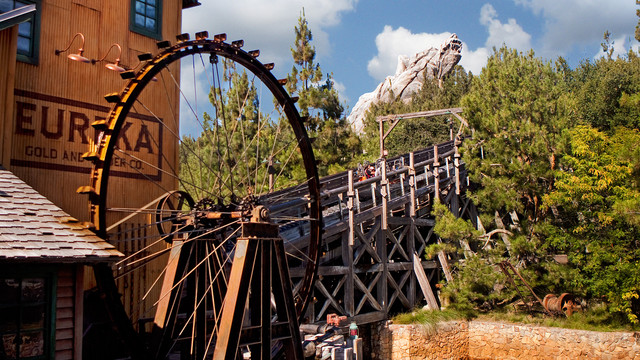
In 2001, California Adventure was divided into four “districts.” One of them – “The Golden State” – contained a half-dozen smaller sub-districts within it, including Grizzly Peak Recreation Area. Frankly, Grizzly Peak was one of the few genuinely wonderful sections of the park, marked by dense evergreens, misty ponds, and spouting geysers.
As you’d expect from “DCA 1.0,” the “story” of this sub-section of the park evidently was that a once-glorious mining operation in a Northern Californian forest had been abandoned decades ago, and an extreme sports company had moved in to salvage the rusted remains and make the wilderness cool again.
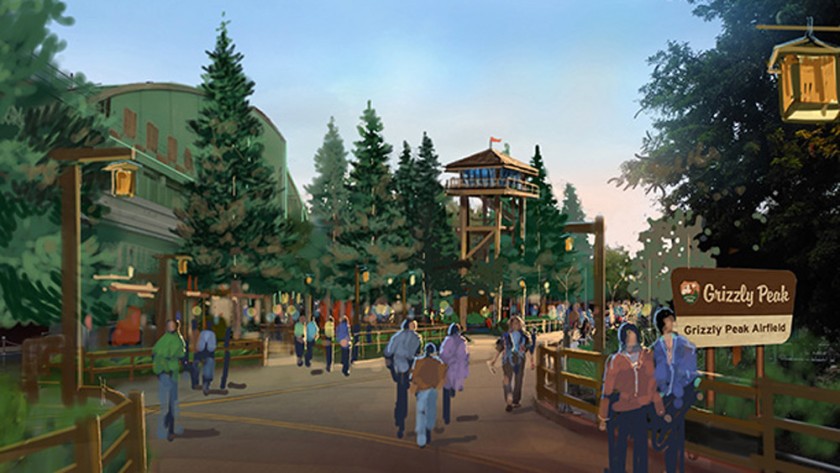
By 2012, the clock had been officially turned back. The “extreme sports” aesthetic was exorcised. Artificially-aged buildings were restored to “new.” And now, guests were cast as visitors to a glorious 1950s National Park at its height. That aesthetic was only strengthened when, in 2015, Condor Flats (another “sub-district” of the former Golden State) was absorbed by Grizzly Peak, too, becoming the National Park’s forested airfield.
Today, Grizzly Peak is one of the most gorgeous lands at any Disney Park. (Its evergreens have grown so tall, it’s difficult to even see the 110-foot tall eponymous mountain from the land itself.) A land of surging waterways, lantern-lit trees, and rustic cabins, all bordered by the Grand Californian Hotel & Spa (which itself serves “in-universe” as the National Park’s lodge), it’s a wonderful little space. Working with such an incredible environment, my goal was simply to evolve it naturally and improve it how I could…
Build-Out

Entering the land from Buena Vista Street’s Carthay Circle, guests arrive at the Grizzly Peak Airfield, at once surrounded in grey mountain rock and evergreens climbing the hillsides of the valley. I made just one necessary change here, turning the Lost Legend: Soarin’ into SOARIN’ OVER THE GOLDEN STATE – what I picture as a new, National Geographic-led ride film for the beloved simulator, restoring Jerry Goldsmith’s score and the ride’s Californian-focused ride film.
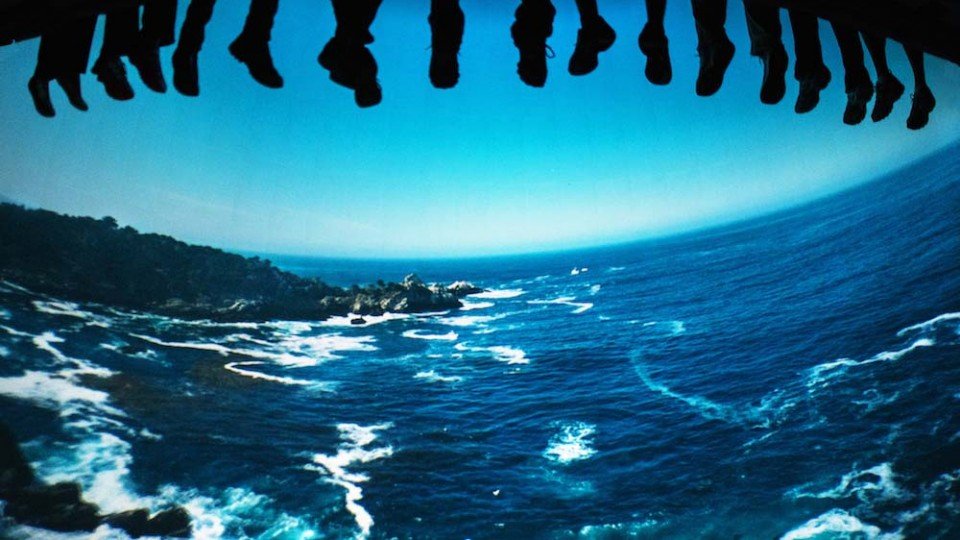
(Transforming the park’s Soarin’ Over California into the pretty agreeably worse Soarin’ Around the World makes practically no sense at California Adventure, so a modern Golden State-focused ride film is an easy fix for the park.)
The first major change to Grizzly Peak in this version of the park would be that – while entering Grizzly Peak National Park proper – guests would cross a bridge over a dry ravine with a roller coaster speeding through backwards, then forwards. Accessed by taking the “dirt” Bypass Road toward the peak itself is GRIZZLY MOUNTAIN RAILWAY – a brand new addition and California Adventure’s first “mountain.”
Though highly modified, I based this coaster’s layout and premise on Big Grizzly Mountain Mine Cars at Hong Kong Disneyland, which weaves through an (unrelated) Grizzly Mountain and the park’s version of Frontierland, Grizzly Gulch. Though the layout and setting would be heavily altered to make their way to California Adventure, the concept is strong… and I think, would be even stronger given California Adventure’s more forested and truly mountainous setting.
Grizzly Mountain Railway would weave through the woods, passing through caverns and tunnels. Then, pulled up alongside a fire watchtower, the train’s lift hill cable would “snap” sending the trains plummeting back down below the treeline, weaving and slaloming backwards down the mountainside, under the path, and into a bear cave. There, curious bears playing with leftover mining equipment would trigger TNT, launching the train back forward into the woods, racing beautifully along the trail and next to geyser pools in a climbing, forested return to the station.
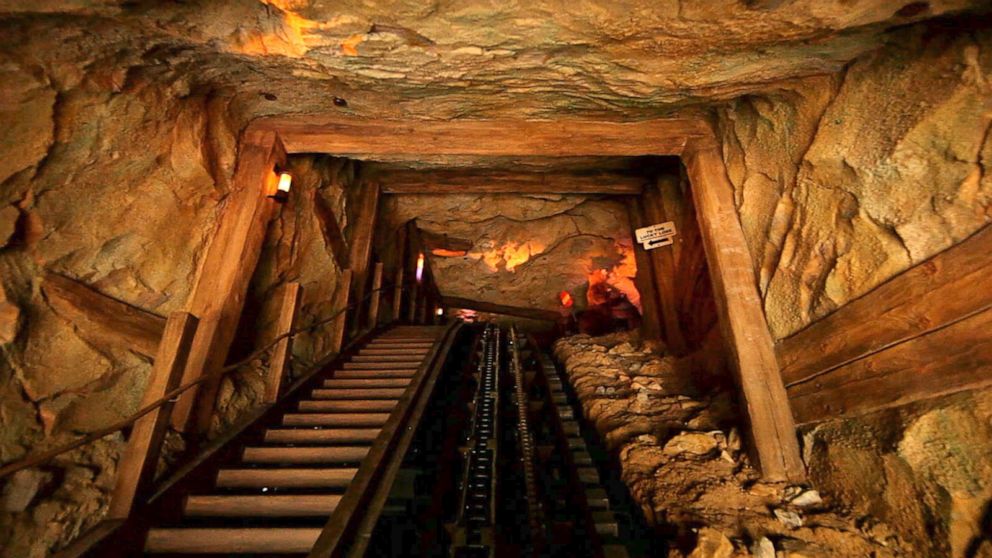
Wedging a full roller coaster into this space wouldn’t be easy. (I initially considered getting rid of the land’s raft ride altogether to have an easier time finding space for the coaster.) But I’m really convinced that this is a perfect “mountain” for the park – a fusion of Big Thunder Mountain, Expedition Everest, Dollywood’s Firechaser Express, all set in a gorgeous evergreen forest. Imagine climbing alongside waterfalls, watchtowers, and geysers, zipping through the dense tree cover a la Kings Island’s The Beast, bobbing and weaving through the woods…
My point being, while it would take substantial effort to make it happen, in my ideal, build-out version of Disney California Adventure, I think this ride makes too much sense to ignore. It also provides the park with a much-needed original E-Ticket, a thrill ride, and a classic Disney “mountain.”

I worked hard to fit Grizzly Mountain Railway in in a way that would salvage the park’s existing white water raft ride. You might be wondering why. Disney has three of these raft rides around the globe (the other two are Kali River Rapids in Orlando and Roaring Rapids in Shanghai). None of them are great, and Grizzly River Run is probably the worst by nature of having almost nothing to specifically look at along the way.
Sure, the setting is beautiful… But the principal of Chekhov’s gun maintains that if you show a gun in Act I, you’ve got to fire it in Act III. And despite the distant “roars” of bears and several caverns that would qualify as their homes, you won’t see any wildlife along the course. Okay, sure, unlike Splash Mountain-style flume rides, these raft rides are for getting soaked, and just aren’t good vehicles for storytelling. But so much can be done here…



So I went ahead and went an unusual route, renaming the ride RAMBLIN’ RIVER RUN. Along the course, I’d insert short-but-sweet visual setups and quick vignettes starring Disney’s 1940s cartoon star Humphrey the Bear (who got a few Easter eggs in the Grizzly Peak Airfield redesign).
Just as when Honda’s ASIMO was added to Disneyland’s Autopia in lightly-animated visual setups, it seems simply enough to turn even the scenes above into simple vignettes with minimal (if any) animation, adding character, humor, and music to the ride’s course. Honestly, these raft rides will probably never be genuine E-Tickets, but at least Humphrey could be used to add character and life in an era-appropriate way. (Neither here nor there, but I wager you could just as effectively introduce vignettes of Russel and Dug from Up as Wilderness Explorers to the same effect, and it would be pleasant and harmless enough that no tears would be shed.)

In any earlier version of my California Adventure build-out, I sadly sacrificed the Redwood Creek Challenge Trail to squeeze a dark ride into this part of the park. I did a little reorganizing in this round in order to salvage it as the REDWOOD CREEK EXPLORATION TRAIL. This incredible multi-acre space contains not just “hiking trails” with scavenger hunt components, but multi-story watchtowers, zip lines, crossable creeks, climbing nets, caves, rock climbing, campfire ceremonies, and more. This is California Adventure’s Tom Sawyer Island and then some – an incredible space.
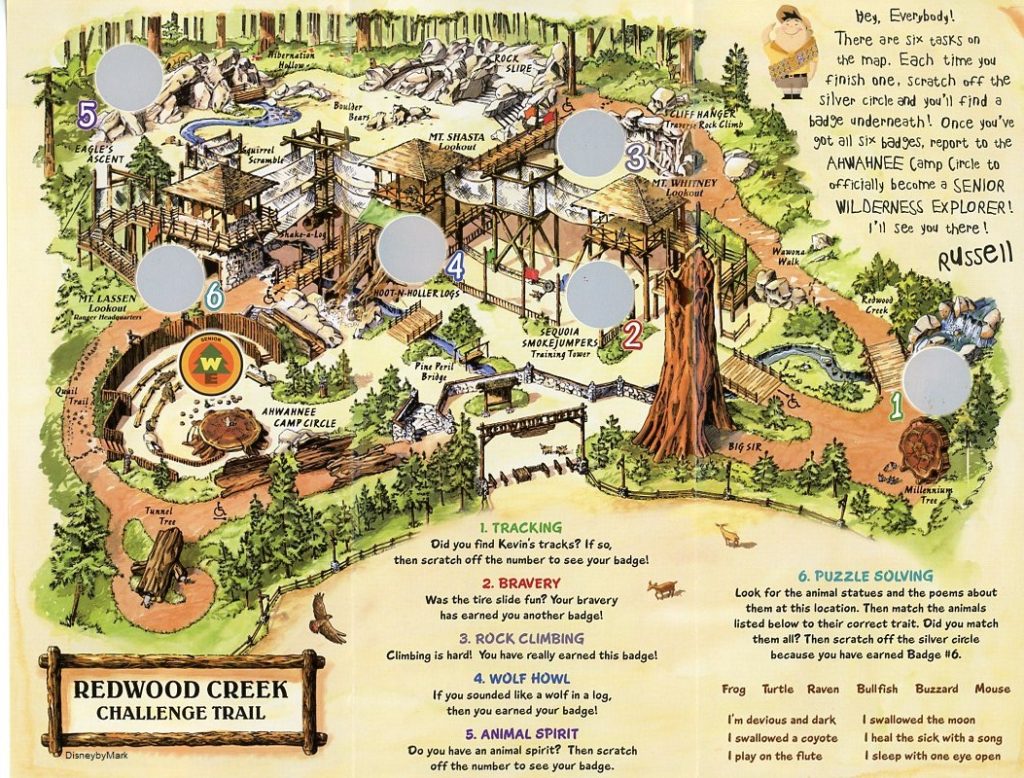
Redwood Creek is an incredible hidden gem. Seriously. Thanks to a longstanding Up integration (which I personally would make permanent, hence my slight name change to an Exploration Trail), guests can “earn” Wilderness Explorer badges at self-guided activity stations, practicing real tracking, investigating tree rings, learning real indigenous stories, and even discovering their “Spirit Animal” in an odd little tie-in to Brother Bear (which is surely a little insensitive today and could easily be reimagined).
Finally, I wanted to use Grizzly Peak to bring back a popular classic…
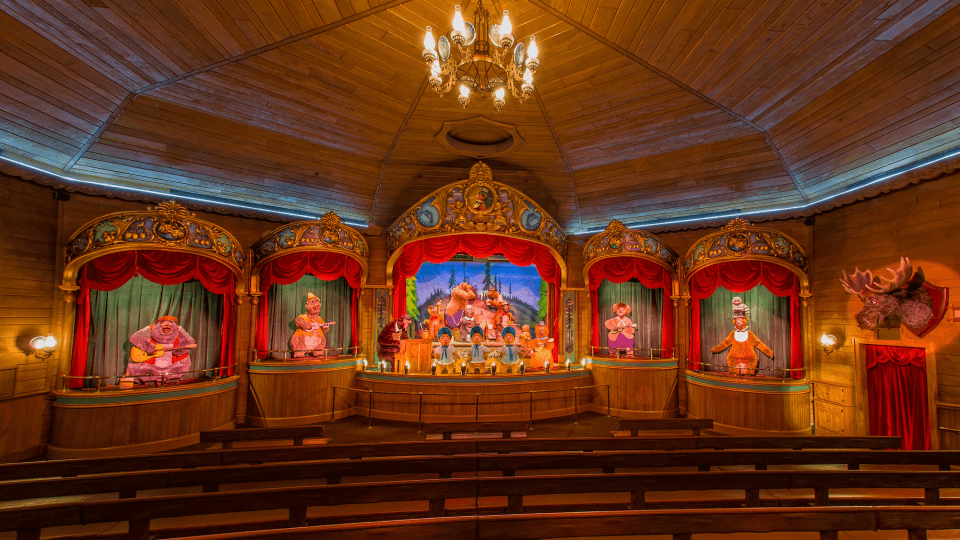
In the farthest edge of the land, I used the totally empty (except for restrooms) “San Francisco” row houses to conceal a new COUNTRY BEAR JAMBOREE, accessed from a lodge along the Grizzly Peak Bypass trail. Disneyland actually did have its own copy of the Modern Marvel: The Country Bear Jamboree, but the space was used for the Many Adventures of Winnie the Pooh dark ride in 2002. Since then, fans have been begging for the Bears’ return, and given that they’re often seen meet-and-greeting in Grizzly Peak, it’s a spot too perfect to pass up.

And just like that, we’ve arrived at the last lands of my reimagined California Adventure: the ones situated around the park’s main lagoon. Read on…
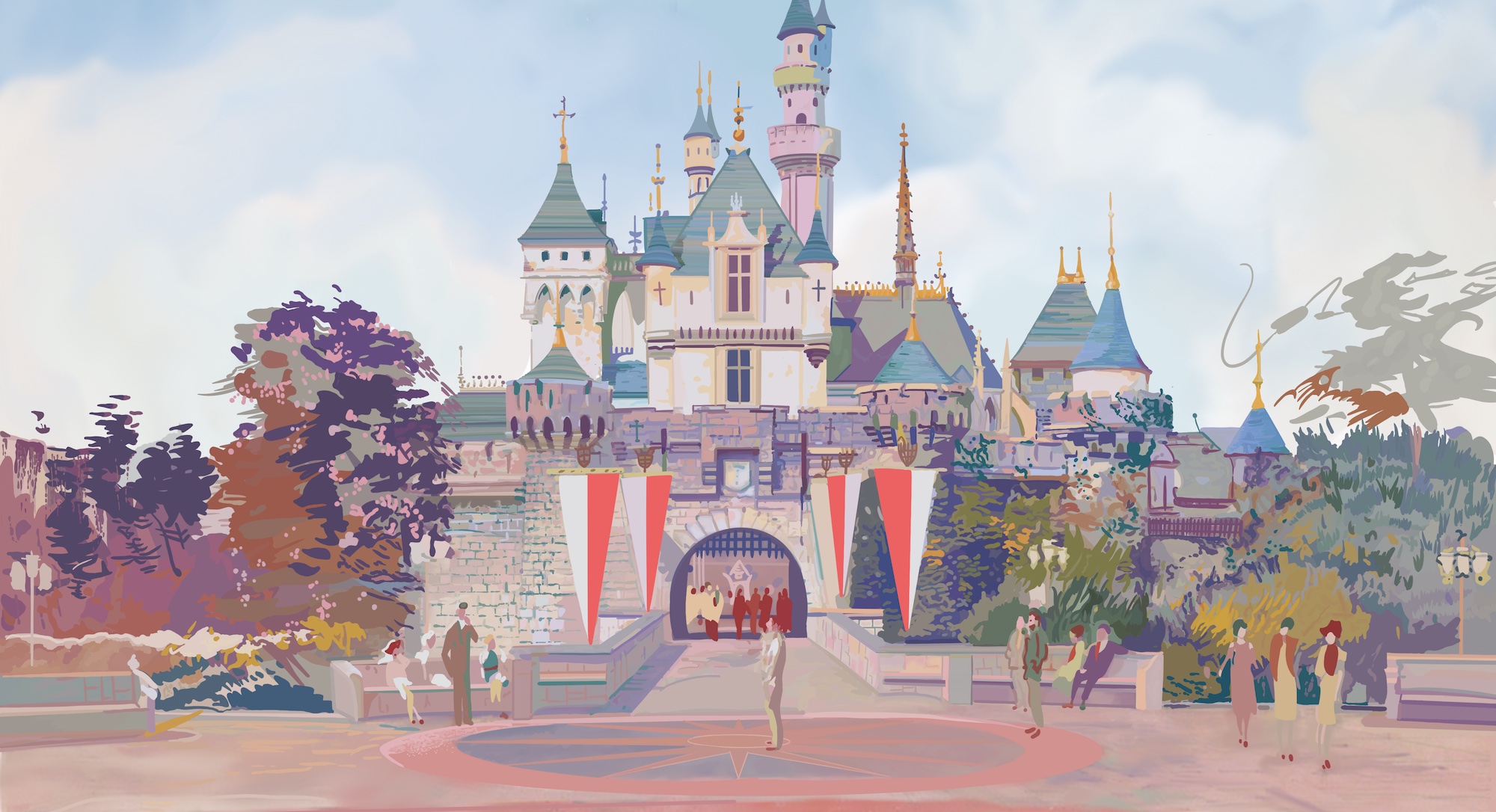

Is Nemo’s Seaskimmers another Aquatopia-styled ride?
Do you ever like to think (in a purely fictional and prideful world) that Disney potentially has some similar ideas to you and then says “oh darn, he used them in his rebuild” so they can’t use them?
For better or worse I don’t think I have a large enough following that anyone from WDI would ever even stumble across my stuff! Hahahah. But that isn’t to say it’s not a cool daydream that someone would say to themselves or to me, “This is great stuff stuff and I would love if we could make it real in the parks just as you’ve drawn it.” But again, I know I’m not actually a professional and that countless real world limitations would stop that from happening every single time! Haha
This is probably my favorite build out as a Disneyland regular. I love the call backs to unused lands like Discovery Bay and the addition of Mystic Manor. Pacific Point gives me a Northern California vibe like close to Oregon area. Can’t wait for your next build out!!
The thing about the 2012 redesign is that, while an idealized California appeals to out-of-towners, it also leans into DL’s identity as a local’s park by giving us places that we cannot visit in real life. I especially love the Carthay Circle restaurant and the Pan Pacific Auditorium gates, because they were torn down before I could ever see them.
Which is a long winded way of saying that the Figueroa tunnel does not belong in California Adventure, because I’ve driven there a hundred times. (To a lesser extent I’m not interested in putting the Chinese Theater in the park, because it’s still there, but I have to admit every time I’ve gone to the Chinese Theater I’ve had fun. Pasadena, however…)